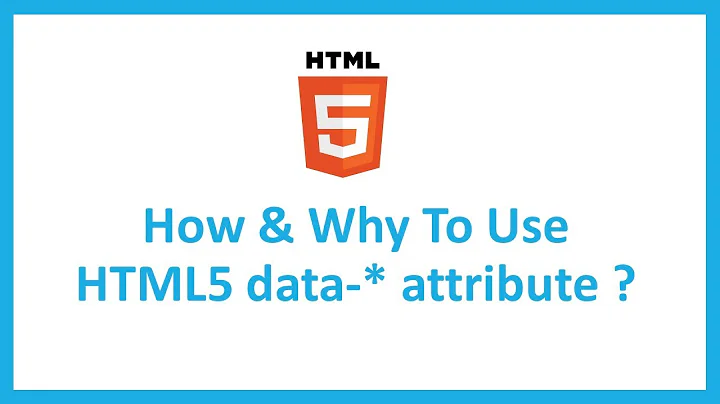rails and html data attributes: use dash(-) or underscore(_)?
Solution 1
After tests I did: seems like in development I had gems in version 3.2.9, and in production it was 3.2.12 - the wrong behavior (convert to <a date-last_name/>) was fixed between those versions, and after upgrading my development version I can see the change.
Solution 2
It's perfectly normal, data: { first_name: "ben" } is supposed to produce data-first-name="ben".
The best way you would access this attribute is with .data("firstName"), but .data("first-name") would also work.
Solution 3
I take it that you are using HAML. Hypernation comes as default since 4.0. Set hyphenate_data_attrs to false to turn this off.
Documentation: http://haml.info/docs/yardoc/Haml/Options.html#hyphenate_data_attrs-instance_method
Original github pull discussion: https://github.com/haml/haml/pull/488
Related videos on Youtube
benams
Updated on September 26, 2022Comments
-
benams over 1 year
Lately, I'm facing problems with HTML custom data attributes in my rails application. I user the following pattern in order to add some data attributes to the html tags and use them later in my javascript(jQuery) code:
= %a.name{ href: "url.com", data: {first_name: "ben", last_name: "amsalem} }In the javascript code I access those attributes:
alert($(".name").data("first_name") + " " + $(".name").data("last_name"));In my development environment it goes well and I get the expected result (the same is true for my production environment in the past), but in my current production version I get "undefined" values. I checked the HTML source of the page and I saw that I now have something like:
<a class="name" href="url.com" data-first-name="ben" data-last-name="amsalem" />Instead of:
<a class="name" href="url.com" data-first_name="ben" data-last_name="amsalem" />Why does it happen? What causes the change?
-
benams about 11 yearsI agree, it's correct and normal. But in previous versions it was data-first_name, so my JavaScript code is data("first_name"). What made this change?
-
Robin about 11 yearsAs far as I know, rails never generated
data-first_namewhen using this syntax{ data: { first_name: "" } }, but I might be wrong. Maybe you were using the string version, likedata: { "first_name" => "ben" }. If not then I have no idea. -
benams about 11 yearsnope, I checked again and I use the symbol version and not the string version. it's a kind of weird, because I'm 100% sure it used to work in my old version and still works in the development environment.
-
Robin about 11 yearsBut there should not be underscores in the first place, since rails generates
data-first-name, right? -
Robin about 11 yearsAre you sure that it was generating
data-last_name? Or do you just know that.data("first_name")was working in your JS? Because it's possible that older jquery version where able to interpret "first_name" as "first-name". But anyways, you should just fix your code and move on ;) -
benams about 11 years100% sure, it was generating
data-last_name. I'll update, thanks. -
darshanags about 11 years@Robin underscores were not automatically replaced with hyphens pre v.4.0: github.com/haml/haml/issues/478
-
Robin about 11 yearsMy bad, I'm so used to the rails syntax, that I did not notice that he wasn't actually using a rails helper, but haml. So yeah, you're right, and I think this should be the accepted answer.
-
Peter Black over 8 yearsI am also 100% sure. What is causing this? We just made the update to rails 4 and nothing with user_id works. This is horrible. It will take weeks to work this out of our app.






